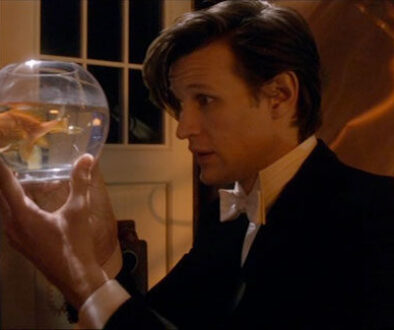Neil Gaiman Q&A Highlights
 Here’s some highlights from Neil Gaiman’s Guardian question and answer session from earlier today.
Here’s some highlights from Neil Gaiman’s Guardian question and answer session from earlier today.
He talks about earlier TARDIS consoles, Time Lords changing gender, becoming a regular writer, the fate of House, the regeneration rule and more.
Q. Why did you use the Tennant era TARDIS as the alternate control room? I would have loved to have seen an earlier version?
A. So would I. But I was not able to reach any of the earlier producers in time and ask them to keep their sets up. Because I came up with the story before the Year Four Specials aired, I was able to ask them to keep the Christopher Eccleston TARDIS interior. It stood in the studio for an extra eighteen months, and they lied to anyone who came past about why it was still there.
Q. The long-standing fan argument (and joke) about whether Time Lords can change gender on regeneration seems to be now definitively settled. Was there any disagreement or debate about that? Does it foreshadowing the appearance of a female Time Lord? Who would you ideal female Time Lord be?
A. The odd bit here is that for me it had been definitively settled when Doctor Eleven tried to figure out whether or not he was a girl. But it seemed to make sense, and it made the Time Lords more interesting for me, not less, and I put it in the script, always as a throwaway.
The description of the Corsair and the Doctor’s relationship with him got shorter and shorter in script after script, but that aside remained, and I’m glad it did, if only because the next time the BBC needs to cast a Doctor, the press and fans get to argue passionately about twice as many actors.
And for me, the definitive lady Doctor will always be Joanna Lumley. She had Dalek bumps.
Q. Will you write another episode? If so, do you know what it might be about? Would you consider becoming a regular DW writer?
A. I don’t know. I’d love to write another episode: this is DOCTOR WHO we’re talking about. Nobody’s asked me, and, which is harder to admit, one reason that the episode was good was that I spent much too much of the last two years writing and rewriting it, while not doing things that people were waiting for. So now I’m trying to catch up on things people are waiting for. I wish there was more than one of me. I could send the spare me off to Cardiff to sit in a corner and do nothing but imagine adventures for the Doctor. That would be grand.
Q. Which Doctor Who episodes have you watched and wished you’d written them?
A. I love being a member of the audience. On Season 5 (Matt’s first season) they sent me every script (because my episode was originally going to be episode 11) and it took all the fun out of it. I knew what was going to happen. I’d had all my gasps while reading.
For Season 6 I asked them not to do that, talked to Steven Moffat about what I needed to know to move the script from episode 11 of Season 5 (No Rory) to Episode 3 (originally, then 4) of Season 6. And he filled me in on that, and on some secret Backstory stuff, and on the significance of The Only Water In The Forest Is The River, and I went off to work.
And am loving watching this series unspoiled. So, none of them.
Q. Who was Idris before? How did she get to the asteroid?
A. You know, in early drafts we learned a lot more about Idris, and she was imprisoned on the asteroid, and she didn’t become the TARDIS until about 20 minutes in. But it only got interesting once she became the TARDIS. So we moved that stuff up. So much Auntie and Uncle etc backstory in my head and in previous scripts — and there was even a lot more that we shot. Adrian and Elizabeth were funny and creepy at the same time, and they had dialogue that indicated that normally the TARDISes when placed in human form say a few words then burn up and die: what our TARDIS did in Idris’s body was unheard of. But then, it was too long, so those scenes, along with many wonderful Uncle and Auntie lines, went away.
Q. Didn’t the Doctor once regenerate from just a hand? Auntie had the Corsair’s hand attached to her, can the Doctor regrow the Corsair from this?
A. The Corsair’s arm (kidneys, spleen etc) is on a bubble universe that reached Absolute Zero pretty quickly, destroying all the cells, Corsair DNA etc. Unless of course someone needs it for a future story, in which case it will have been perfectly preserved. But in my head, no, it’s destroyed.
Q. Was it made clear exactly what happened to House? I feel his fate was left a little ambiguous. I imagine his essence still floating around out there….starving maybe…but still alive…waiting for food?
A. In almost all the drafts of the script until we reached shooting, they buried Idris’s body. And in most of those drafts it was very clear that House had absolutely survived. Right now, it’s a lot more ambiguous. But I like disembodied baddies. Something you can’t see can be just as scary as things you can. (One of my favourite Doctor Who baddies as a child was the Great Intelligence, and House was as much a tip of the hat to that as it was a steal from Arthur Conan Doyle — WHEN THE WORLD SCREAMED — and a wave at my friend Harlan Ellison.
Q. If there are dozens of new control rooms that the Doctor hadn’t even seen, does this mean that the plan is to just keep going with the regenerations and ignore the rule of 13 bodies?
A. It’s interesting, that rule. It was obviously bendable to begin with (the Time Lords gave the Master a whole new round of regenerations). So I’ve always thought that it was more a law like a speed limit is a law than like Gravity is a law. And if there are no longer any police to make you observe the speed limit, you can drive as fast as you like. Although it’s a lot more dangerous. And that’s my opinion. As to what Mr Moffat thinks, he may either have a plan, or he may figure it’s not his problem, but is one for eight or ten years down the line.
Q. What happened to the souls of other TARDISes?
A. They were put into the heads of people who had wound up being sucked through the Rift-Plughole and were not expecting what happened to them. The House would start to feed on the Artron energy. The person the TARDIS matrix had been put into would mutter a few words, or scream, or just lapse back into unconsciousness. And then, in a couple of minutes, or an hour at the most, the host body would die, the TARDIS energy would be released, and have nowhere to go, and twinkle, and swirl, and be gone.
Head here to read the rest.







